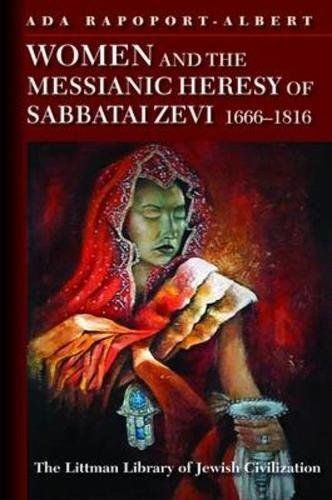
Women and the Messianic Heresy of Sabbatai Zevi 1666--1816
Women are conspicuously absent from the Jewish mystical tradition. Even if historically some Jewish women may have experienced mystical revelations and led richly productive spiritual lives, the tradition does not preserve any record of their experiences or insights. Only the chance survival of scant evidence suggests that, at various times and places, individual Jewish women did pursue the path of mystical piety or prophetic spirituality, but it appears that efforts were made to suppress their activities. This contrasts sharply with the fully acknowledged prominence of women in the mystical traditions of both Christianity and Islam. It is against this background that the mystical 17th-century messianic movement known as Sabbatianism stands out as a unique exception. Its attitude to women was highly liberationist: the leader of the movement, Sabbatai Zevi, promised to make them 'as happy as men' by releasing them from the pangs of childbirth and the subjugation to their husbands ordained for women since biblical times. This redemptive vision became an integral part of Sabbatian eschatology: in their view, the messianic era was unfolding in the present, and as part of this their New Law superseded the Old and overturned the traditional halakhic rules governing relations between the sexes. This was expressed not only in the ritual transgression of sexual prohibitions but also in the apparent adoption of the idea - alien to rabbinic Judaism - that virginity, celibacy, or sexual abstinence were conducive to women's spiritual empowerment. In this book, author Ada Rapoport-Albert traces the diverse manifestations of this vision in every phase of Sabbatianism and its offshoots, demonstrating how the culmination of the Sabbatian endeavor was to transcend the traditional gender paradigm that had excluded women from the public arena of Jewish spiritual life. *** "Exhaustively researched and brilliantly written . . . One aspect of Frankism on which Rapoport-Albert is especially good is the peculiar tension between sexual libertinism and asceticism." - David Biale, Jewish Review of Books, Winter 2012 *** "A fascinating book . . . Rapoport-Albert shows with great scholarly detail that women were actively involved in the Sabbatian movement . . . Some of the details in this volume are startling, but the work opens up an intriguing and valuable window to the status of women in east European Jewish life." - Jewish Orthodox Feminist Alliance Journal *** "Not only breaks down many stereotypes about the roles of women in Judaism and Jewish society, but it is also a major contribution to understanding how Sabbatianism and Frankism spread and operated . . . rich in original ideas and insights. While many of the topics call for further research, the rich documentation Rapoport-Albert brings to bear on the topics leave little room for doubt that a call for changed gender roles, to a greater or lesser degree, was a central element in the Sabbatian and Frankist movements. It is a very stimulating contribution to the literature on Kabbalah, on modern religious movements, on gender history, as well as on conservative responses." - Shaul Stampfer, Religious Studies Review, Vol. 38, No. 2, June 2012 *** "...Ada Rapoport-Albert's book is a thorough analysis of sources. It is very well documented and very inspiring. The book should not only be studied by those who are interested in Sabbatianism and gender studies, but also those intrested in the historical study of religion, ideology, and ideas." - H-Net Reviews, September 2012, www.h-net.org